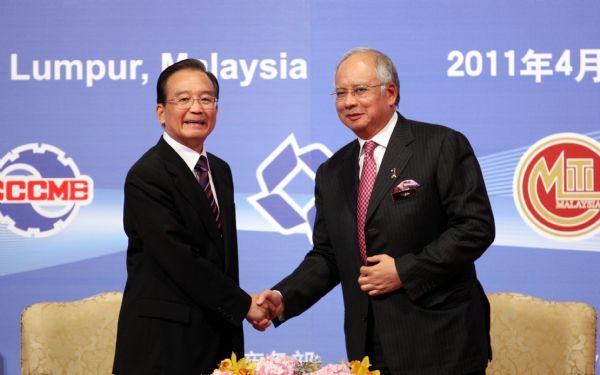China, Malaysia in US$3 bln pact boost
China and Malaysia signed eight cooperation contracts on Thursday as visiting Premier Wen Jiabao and his counterpart Prime Minister Najib Razak vowed to upgrade already successful commercial ties. China is Malaysia's top trading partner.
|
|
|
Chinese Premier Wen Jiabao (L) and Malaysian Prime Minister Najib Tun Razak attend the Malaysia-China Economic, Trade and Investment Cooperation Forum in Kuala Lumpur, Malaysia, April 28, 2011. [Xinhua photo] |
The deals, reportedly worth US$3 billion, include a contract between China Huadian Engineering Co and Malaysia's Janakuasa to build a coal-fired plant and an agreement between Malaysian mobile service provider DiGi and China's ZTE Corporation to supply telecom infrastructure.
Aluminum Corporation of China also signed a joint venture agreement with Smelter Asia Sdn Bhd to build a US$1 billion smelter in Sarawak.
|
Don't miss: |
China is Malaysia's largest trading partner and its second-largest export destination. It was also the largest source of Malaysian imports in 2010. Malaysia has been China's largest trading partner in ASEAN for the last three years.
Bilateral trade reached US$74.2 billion in 2010, according to China's General Administration of Customs.
The two governments also reached agreements on expanding and deepening economic and trade cooperation, and on frameworks to facilitate mutual recognition of higher education qualifications.
After their meeting at the premier's office, Razak told reporters that Wen also promised to import more Malaysian palm oil and palm oil products and agreed to establish a research center for traditional Chinese medicine in Malaysia.
On the financial sector, he said both sides want to push for trade that is settled in local currencies. The quantity of trade settled in local currencies between the two countries in the first quarter of this year has already exceeded the total for 2010, he added.
"We have every confidence thatChina will continue to prosper and to provide strong impetus in terms of global economic growth and more importantly in the context of bilateral ties where we can look forward to many, many years of strong, deep and very friendly ties between our two countries," he said.
Wen said he hopes that Malaysia will provide greater access for Chinese goods.
"China has long been running a very large trade deficit with Malaysia, but we have never complained about that," Wen said, adding China welcomes more competitive Malaysian products coming to China and hopes that Malaysia will import more Chinese goods.
According to a press release from China's Foreign Ministry, Wen welcomed Malaysian enterprises to join in the development of China's midwest and northwest regions.
"There are no conflicts of fundamental interest between China and Malaysia," Wen said.
Wen, according to the press release, also called on the two countries to boost maritime cooperation and ensure the safety of the Malacca Straits.
There has been friction in the relationship between the two countries over the Nansha Islands in the South China Sea. The United States has been accused of interfering in the dispute with its "back to Asia" policy. Last July, US Secretary of State Hillary Clinton suggested that countries should resolve the dispute through diplomacy with US involvement.
Wen said in an interview on Monday that he believed the countries concerned should carry out joint development in the South China Sea.
The commercial deals between the two countries marked a new step in bilateral economic ties, said Luo Yongkun, a researcher with the China Institute of Contemporary International Relations.
"Developing infrastructure and mutual investment are good ways to boost economic ties," Luo said.
He also noted that it was important to boost maritime cooperation.
Accompanied by a 118-member delegation, including several ministers, Wen finished his two-day Malaysia visit on Thursday.
He arrived in the Indonesian capital on Thursday night for the first official visit of a Chinese premier in a decade.
During the visit he is expected to witness the signing ceremonies of a series of cooperation pacts.
 0
0 








Go to Forum >>0 Comments